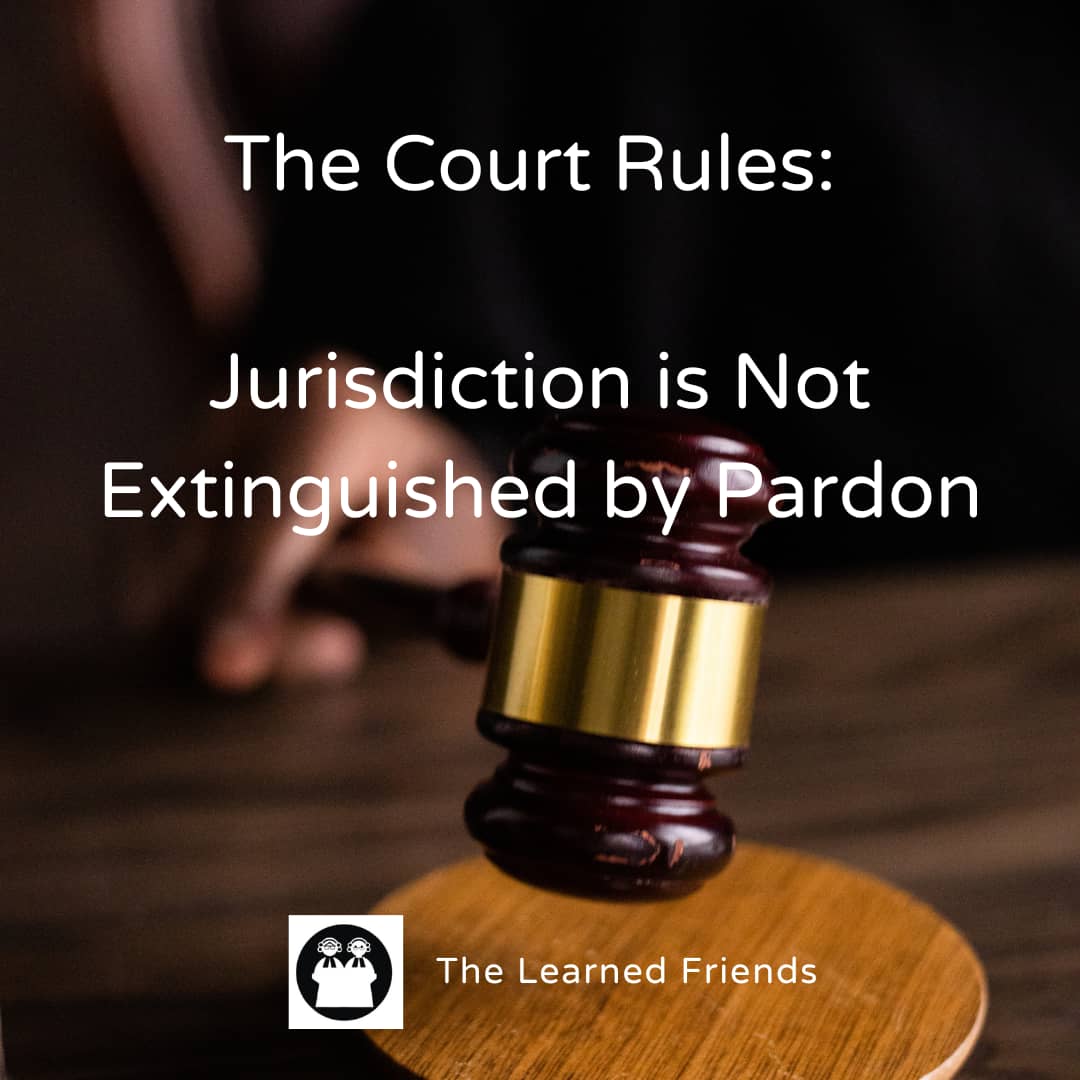
.png)
I would like to spotlight as well as appreciate TheLearnedFriends an organization dedicated to bridging the gap between legal education and real-world experience for law students through internships.

My internship at Copley Partners has been nothing short of insightful, experience filled and a great start in my search for practical knowledge on law. Thank you TheLearnedFriends I had a very incredible internship experience.

Special thanks to TheLearnedFriends for the invaluable opportunity to intern at CLP Legal.
I do not take this opportunity for granted.

Our member's corner provides a space for easy flow of ideas and information on the ever changing legal space.

Take advantage of our frequently updated legal calendar to keep up with exciting events with details and links for your ease .



Hearsay is an out-of-court statement offered to prove the truth of whatever it asserts, which is then offered in evidence to prove the truth of the matter. The problem with hearsay is that when the person being quoted is not present, it becomes impossible to establish credibility. As a result, hearsay evidence is generally not admissible in court. However, there are exceptions to the hearsay rule, which are explained below.

The first exception to the hearsay rule is the "excited utterance" exception. This exception applies when someone makes a statement during a startling event, in the heat of the moment, potentially providing an unguarded and accurate piece of information. This exception is most applicable in criminal cases, as the rationale behind it is that during or immediately following a criminal act, a person is not likely to have the presence of mind to lie or give false statements. In order for a statement to qualify as an excited utterance, it must have been made in conjunction with an event that would be so overwhelming as to discount the possibility of fabrication.

The second exception to the hearsay rule is the "statements against interest" exception. This exception applies to statements or actions that adversely affect the party who made the statement. These statements do not need to be formal admissions. The theory behind this exception is that a person would not fabricate a statement that is adverse to their own best interest. However, the witness offering the hearsay testimony may not be telling the truth, but that goes to credibility, not admissibility.
Source: law.cornell.edu

Simply put, it is the crime of killing a human being without malice aforethought, or in circumstances not amounting to murder. It is a legal term for homicide considered by law as less culpable than murder. Manslaughter, under Nigerian criminal law, is where an unlawful killing is done without an intention to kill or cause grievous bodily harm. Theaccidental killing of a person is referred to as involuntary manslaughter while voluntary manslaughter is caused as a result of provocation. Under section 325 of the Criminal Code, any person who commits the offence of manslaughter is liable to imprisonment for life.

Known as a contract made orally or by writing not under a seal. Itis a contract partly or entirely oral and therefore unenforceable under the statute of frauds. It is also known as a simple contract. In contract disputes, Parol evidence is any agreement that is not contained within the written contract. Under the Parol evidence rule, these agreements made outside of the contract are in admissible in court unless there is evidence of fraud, duress or a mutual mistake. The rationale behind the rule is to deter untruthful attacks on contracts.

A trust is the relationship that arises where a person (trustee) is compelled in Equity to hold property whether real or personal and whether by legal or equitable title for the benefit of some persons (of whom he may be one and who are termed c’estuis que trust)or for some object permitted by law in such a way that the real benefit of the property accrues not to the trustee but to the beneficiaries or other objects of the trust. It is both a legal or equitable obligation imposed on one (trustee) to hold the property for the benefit of other persons (beneficiaries) of whom he himself may be one or also for some other objects permitted by law.

Trust is usually compared and contrasted with topics such as bailment, agency, contract, personal representatives, power, etc. Trust can be classified into Express, Implied/Resulting, Constructive trust, Private & Public trusts, Executed & Executory trusts, Completely & Incompletely Constituted trusts.

Battery is the unlawful application of force directly or indirectly upon another person or personal belongings, causing bodily injury or offensive contact. The attempt of battery, however, isassault. In both civil and criminallaw, battery is understood as the intentional touching of, or application offorce to, the body of another person in a harmful or offensive manner (andwithout consent). A battery is almost always preceded by anassault thus a battery is often confused with an assault, which is merely theact of threatening a battery, or of placing another in fear or apprehension ofan impending and immediate battery.

An individual commits a battery if he acts intentionally either to cause harmful or offensive physical contact or to cause imminent apprehension of such contact and a harmful or offensive contact actually occurs. The prima facie (at first appearance) case for battery contains 4 components:
a. The defendant acts.
b. The defendant intends to cause contact with the victim.
c. The defendant’s contact with the victim is harmful or offensive.
d. The defendant’s contact causes the victim to suffer a contact that is harmful/offensive.

In law, the word ‘jurisdiction’ poses different meanings depending on the context in which the word is used. Jurisdiction could mean the right, power, or authority to administer justice by hearing and determining controversies. It could also mean the extent or range of judicial, law enforcement, or other authority. Jurisdiction in legal parlance could also mean the territory within which a court or government agency may properly exercise its power. It is the power of the court to adjudicate cases and issue orders.

A jurisdictional component may be broken-down into three components.
1. Whether there is personal jurisdiction.
2. Whether there is jurisdiction over the subject matter.
3. Whether there is jurisdiction to render the particular judgment sought.
Jurisdiction may be general or specific.

A mortgage is a legal or equitable conveyance of title as a security for the payment of debt or the discharge of some other obligation for which it is given, subject to a condition that the title will be reconveyed if the mortgage debt is liquidated. The conveyor or the obligor as the case may be is known as the mortgagor, the lender or the obligee who receives the interest in the security is called the mortgagee, and the debt for which the security was initially created is called the mortgagee debt.

Mortgage is a proprietary security in the sense that the substance of the mortgage is a right of property vested in the mortgagee which entitles the latter by virtue of this title to have the rents & profits applied to satisfy his debt.

Cross-examination is the act of the opposing party questioning the witness during a trial. Generally, a witness is initially questioned by the party who called them to the stand on direct examination. During their evidence-in-chief, a witness is given the opportunity to give their version of events on behalf of the party who called them.

Cross-examination is the opportunity for the other side to put its version of events to the witness (known as ‘putting the case’) and to raise any other relevant matters which are capable of undermining their evidence. The Merriam-Webster Dictionary defines it as the examination of a witness who has already testified in order to check or discredit the witness's testimony, knowledge, or credibility.

Arbitration is a procedure in which a dispute is submitted, by agreement of the parties, to one or more arbitrators who make a binding decision on the dispute. In choosing arbitration, the parties opt for a private dispute resolution procedure instead of going to court. Arbitration is a private process where disputing parties agree that one or several individuals can make a decision about the dispute after receiving evidence and hearing arguments.

Arbitration can only take place if both parties have agreed to it. In the case of future disputes arising under a contract, the parties insert an arbitration clause in the relevant contract. An existing dispute can be referred to arbitration by means of a submission agreement between the parties. In contrast to mediation, a party cannot unilaterally withdraw from arbitration. Arbitration is a confidential procedure, and the decision of the tribunal is final and easy to enforce.

The term simply means an individual or entity who commits a wrongful act, either intentionally or through negligence, that injures another or for which the law provides a legal right through a civil case for the injured person to seek relief.

A tortfeasor is a person who commits a tort, delict, or quasi-offense. Another definition for the term could mean any person, excluding the injured person, whose fault is a proximate cause of death, bodily personal injury, economic loss, or physical damage to property for which recovery is sought, regardless of whether that person is joined as a party to the action, and regardless of whether that person may have settled with the plaintiff.

Estoppel refers to a legal principle that prevents someone from arguing something or asserting a right that contradicts what they previously said or agreed to by law. Simply put, estoppel prevents one person from contradicting an action or statement from the past. It is a legal bar to allege or deny a fact because of one's own previous actions or words to the contrary.

According to Black's Law Dictionary, estoppel is a bar or impediment which precludes allegation or denial of a certain fact or state of facts, in consequence of a previous allegation or denial or conduct or admission, or in consequence of a final adjudication of the matter in a court of law. A principle of common law, it is meant to prevent people from being unjustly wronged by the inconsistencies of another person's words or actions. Types of estoppels include collateral estoppel, equitable estoppel, and promissory estoppel. Estoppel certificates are commonly used in real estate and must be signed by tenants when the landlord is trying to conduct a transaction with the property.

According to the Black’s Law Dictionary, an alibi is a defense based on the physical impossibility of a defendant's guilt by placing the defendant in a location other than the scene of the crime at the relevant time. It is the fact or state of being elsewhere when an offense was committed. It is an excuse used by a person accused or suspected of a crime. In the original Latin, it means "in another place" which has to be the ultimate alibi.

When a person, charged with a crime, proves that he was, at the time alleged, in a different place from that in which it was committed, he is said to prove an alibi, the effect of which is to lay a foundation for the necessary inference, that he could not have committed it. The proof of which can be made by the testimony of witnesses or in writing.

A “Record Label” or a Record Company is an entertainment company that manufactures, distributes, and promotes the music recordings of musicians that are affiliated with it. Record labels sell and promote the entertainment products of the artists that have signed contractual agreements with them.

A Record Label can be incorporated as an entertainment company in Nigeria by following the provisions of the Companies and Allied Matters Act (2020). A Record Label may also take advantage of the provisions in the various entertainment laws in Nigeria like the Trademarks Act (1990) and the Copyrights Act (2004) to protect their entertainment products.

Some examples of the major Record Labels in Nigeria include Mavin Records, Davido Music Worldwide (DMW), YBNL Records, and Spaceship Records.

The National Gallery of Art was established as a parastatal by Decree No. 86 of 1993 and the Amendment Act of 2004. The National Gallery of Art was established in response to the provisions of Nigeria’s Cultural Policy which was launched in 1988 in accordance with the recommendations of the committee of the World Decade for Cultural Development(WDCD) approved by UNESCO.

The main exhibition of the National Gallery of Art is the National Modern Gallery of Art located at the National Art Theatre, Iganmu, Lagos. The Gallery is responsible for acquiring and collecting Nigerian works of art, amongst other relevant duties related to the preservation of Nigerian works of art.

The Body of Benchers is the body with the highest distinction in the legalprofession in Nigeria responsible for the formal call to the Bar of personsseeking to become legal practitioners in Nigeria. The Body of Benchers is established under Section 3 of the LegalPractitioners Act (1962).

The Body of Benchers consists of the following members:
a) The Chief Justice of Nigeria and all the Justices of the Supreme Court.
b) The President of the Court of Appeal.
c) The Attorney-General of the Federation.
d) The Presiding Justices of the Court of Appeal Divisions.
e) The Chief Judge of the Federal High Court.

f) The Chief Judge of the Federal Capital Territory, Abuja.
g) The Chief Judges of the States of the Federation.
In the amendment of the Legal Practitioners Act in 1990, the following other persons were made to constitute the Body of Benchers:

h) The Attorneys-General of the States of the Federation.
i) The President of the Nigerian Bar Association.
j) The Chairman of the Council of Legal Education.
k) Thirty legal practitioners nominated by the Nigerian Bar Association.
l) And not more than ten persons who appear to the Body of Benchers to be eminent members of the legal profession in Nigeria of not less than 15 years of post-call standing.

The Body of Benchers is a body corporate with perpetual succession and a common seal.
The Chief Justice of Nigeria shall hold office as a Bencher for life.
The Body of Benchers may make various regulations, including providing for an increase in its membership, the conferment of life membership on any Bencher, and providing for the appointment of any person of distinction in any country with an honorary member of the Body.

The current Chairman of the Body of Benchers is Chief Wole Olanipekun, CFR, SAN. The current Vice-Chairman of the Body of Benchers is Hon. Justice Mary U.Peter-Odili, CFR. To know more about the Body of Benchers see Section 3 of the Legal Practitioners Act, 1962 (as amended).

Bailiffs are significant to the smooth running of the Nigerian judicial system. In the case of Emeka v. Okoroafor & Ors (2017), Honourable Justice Kekere-Ekun (J.S.C) held that a bailiff must carry out his statutory duty in accordance with the rules or order of Court

A bailiff may serve an order of a Court on a person either through personal service or substituted service. Personal service involves physically serving a court order to a person while substituted service involves pasting a court order at the last known address of the person to be served, by publication of the court order in a newspaper or through any other means provided by the Court

For more on the role of bailiffs in the Nigerian judicial system see the Sheriffs and Civil Process Act (2004)
.png)




